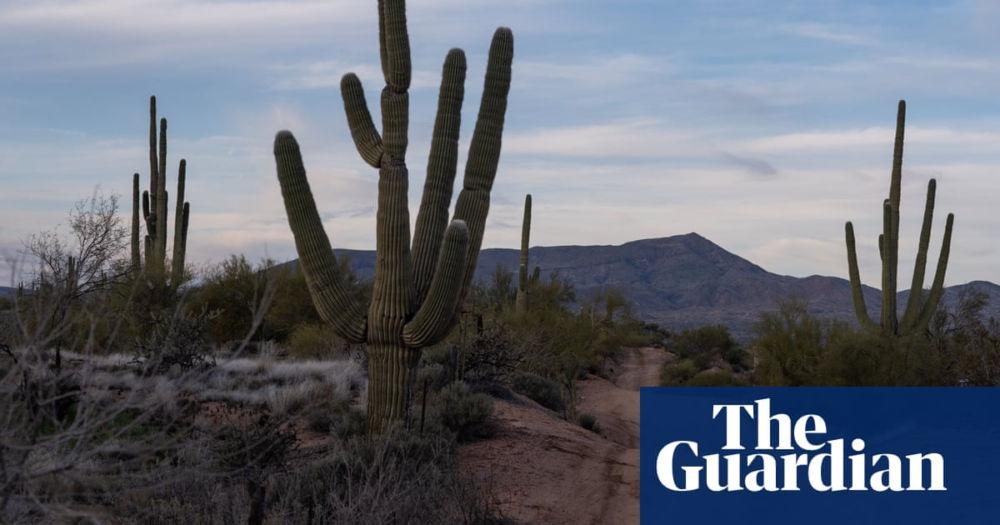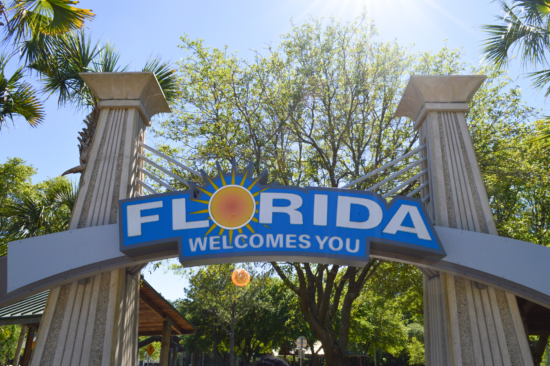Residents of Rio Verde Foothills had their water turned off by Scottsdale, which cites the mega-drought for the move
In the warmth of Arizona’s winter sun, 50 residents gathered in front of neighborhood activist Cody Reim’s house last weekend, eager to discuss a solution to their problem. Despite living a few miles from a river, their community has no water supply services.
With a megaphone in hand and a case of bottled water at his feet, Reim called out to the crowd in his yard.
“I do not have a prepared statement. I am not a politician. I’m your neighbor, and I’m here trying to help,” he said.
In Rio Verde Foothills, an unincorporated community with no municipal government, near Scottsdale, the fashionable, wealthy desert city adjoining the state capital of Phoenix, none of the homes are connected to a local water district.
There is only one paved road, no street lights, storm gutters or pipes in the ground. Instead residents have wells – or water tanks outside their homes, which they used to fill at a local pipe serviced by Scottsdale.
But three weeks ago, Scottsdale turned off that water pipe, cutting off Rio Verde Foothills residents’ supply. Scottsdale said it was forced to make the move because of the prolonged mega-drought affecting the US south-west.
Now if residents want piped water they have to drive an hour each way to Apache Junction, a city that’s allowing people to fill their tanks, for a fee, or pay a hauler to do the same. And locals said that instead of paying 3c a gallon for water previously the rate is now 11c, which has households scrambling.
Digging a well isn’t a viable option for everyone, some of the homes were built on harder sediments that make groundwater access more difficult. Residents whose properties can support a well said quotes to create one hovered around $60,000.
Reim said his family now take their laundry to his parents’ house elsewhere and at mealtimes they use paper plates and disposable cups to avoid using water to wash dishes.
Rose Carroll, another resident, said she was collecting rainwater in buckets to fulfill basic tasks like flushing her toilet.
One neighbor raised her hand to ask if there was a plan for fire suppression. On the dirt roads that span the neighborhood, there are no fire hydrants – but plenty of flammable desert flora.
“I pray that this doesn’t go into the summer,” Reim replied grimly.
Laura Weaver told the Guardian her community didn’t “want a handout” from Scottsdale. They want time to figure out a plan and, to her, Scottsdale shutting the water off is unneighborly and un-American, she said.
“Think of the sacrifices some Americans have made for each other. And then these people are sitting here saying, ‘Well, you know, you should just dry up and die.’ Really? I just find it mind-blowingly unpatriotic,” she said.
Some neighbors joined forces to sue Scottsdale, hoping the city authorities would be obliged to turn the community water pipe back on – even if just temporarily.
“Scottsdale has caused a humanitarian crisis for these residents and their families,” said Dan Slavin, a lawyer representing the Rio Verde Foothills plaintiffs.
At a hearing last Friday in Maricopa county court, Judge Joan Sinclair was not convinced, and denied the neighbors’ request.
“Water is life in Arizona,” the resulting court order read. But sorting out a water dispute, the judge wrote, is the government’s job, not the court’s.
Rio Verde Foothills residents don’t all agree on how to proceed. The community knew for years that Scottsdale might turn the water off if the drought got worse, but neighborhood squabbles over possible solutions cost them time. Others say they were unaware of the city’s looming cutoff date until a few months ago.
Incorporating could give the community more options for water supply in future but forming an official town or city brings requirements, such as paved roads, street lights, more taxation and rules. This would be expensive but also change the secluded, quaint feel of Rio Verde Foothills, where people own chickens, donkeys, horses and ride motorbikes straight out their doors to nearby Tonto national forest.
And forming a new water utility district doesn’t appeal either, with residents reluctant to have another government agency overseeing their neighborhood.
“I don’t want to control water. That’s not my business,” Reim said. “I just want my neighbors to have water [locally] from whatever source we got to get it from.”
Many would rather work with a private utility company. But approval for that process does not happen overnight. For now, they’re forced to make do, conserving water, buying purification equipment or driving out of town to fill up their tanks with friends’ garden hoses if they don’t want to rely on Apache Junction.
The topic of bartering came up at the gathering.
Reim offered free eggs from his own hens.
“Can we trade eggs for water?” resident Jennifer Schuck said, laughing.
“I will take water for eggs,” Reim announced.
Scottsdale’s decision to cut the water is a sign of what could await other communities in a region that, along with many, is getting drier and hotter in the climate crisis.
Twenty years ago, scientists overestimated the amount of water in the Colorado River, having measured based on an abnormally rainy season, said Sinjin Eberle, intermountain west communications director for American Rivers, a non-profit campaigning to protect and restore US waterways.
The river has 20% less water than it did in 2000, Eberle said. More than 40 million people in seven states served by the Colorado River basin – Wyoming, Colorado, Utah, Nevada, California, New Mexico and Arizona – depend on the mighty but dwindling watercourse that flows through the Grand Canyon.
Now, as rain is scarcer and the region’s population has increased, there will be more water shortages, even as sprawling developments insist on golf courses, grassy parks and fountains.
Even in Rio Verde Foothills new home construction carries on apace, while the water is not there to support expansion.
The community’s plight, Eberle warned, is “sort of a canary in a coalmine”.
Their Arizona community was ideal. Then their neighbor cut off the water – The Guardian US

(Visited 1 times, 1 visits today)


